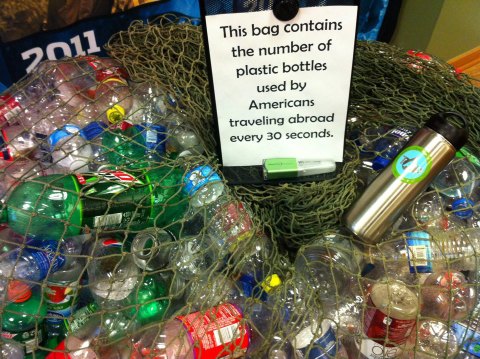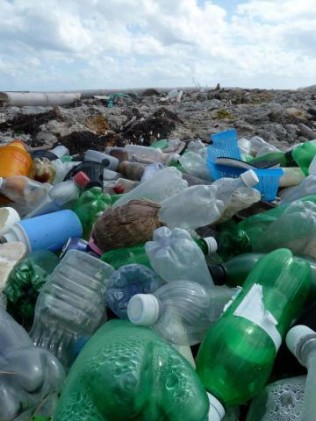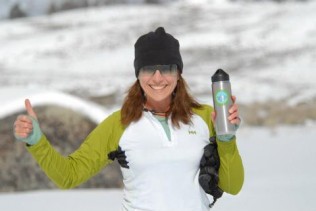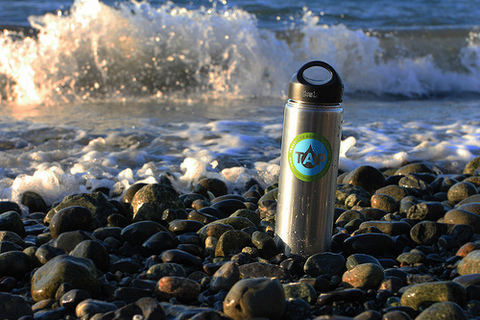
Purchasing a plastic bottle of water or two while traveling may not seem like a huge deal on an individual level, but multiply that by the number of travelers crisscrossing the globe every day and the impact is massive. On a global scale, 2.7 million tons of plastic are used annually for water bottles. Of the billions of single-use water bottles consumed in the United States every year, 86 percent end up as litter or in landfills; in many countries this number is even higher. For local communities stuck dealing with the waste, plastic bottles can be a big problem.
Yet the environmental impact of plastic bottles goes beyond the question of garbage. PET plastic is made from crude oil, with toxic emissions 100 times those of glass production. In the US alone, more than 1.5 million barrels of oil are consumed annually to produce plastic water bottles—enough to fuel 100,000 American cars for a year. Add to that the fuel consumption and other transportation costs of hauling all those bottles around—often over long distances—and the energy use becomes truly astounding.

Most responsible travelers recognize that buying disposable plastic water bottles is bad for the environment – not to mention expensive – but that awareness doesn’t always translate into widespread behavioral change. In many cases, what’s holding travelers back is not a lack of will but a lack of awareness of how to eliminate their reliance on bottled water.
“I see responsible travelers who would never buy a plastic water bottle at home, but as soon as they travel abroad it’s a different story,” says Chris Mackay, co-founder of Travelers Against Plastic—appropriately shortened to TAP—a new campaign that aims to get rid of plastic water bottle waste by educating travelers and promoting simple solutions for safe drinking water on the go.
TAP organizers estimate that US travelers alone discard up to 3.5 billion plastic bottles worldwide on an annual basis. Many travelers buy bottled water simply because they don’t know what else to do, but Mackay points out that there are many viable alternatives. To make things as convenient as possible for travelers, TAP has partnered with Klean Kanteen and SteriPEN to offer a quick and easy way to treat water. Klean Kanteen makes durable metal water bottles that can be reused over and over again. SteriPEN is a simple gadget that purifies water using UB light technology, destroying more than 99.9 percent of bacteria, viruses, and protozoan cysts such as giardia and cryptosporidia. One SteriPEN will clean as many as 8,000 liters of water.
“The mission of TAP is just to get people to stop using plastic water bottles. I don’t care what system they use, but we’re just making it easy by suggesting something right off the bat. I’ve used just about every method out there to clean water, and I’ve found that SteriPEN is easy,” says Mackay. “It’s not something that requires people to think really hard and make a challenging choice. It truly is easy. And it’s cheaper than buying all that bottled water, too.”

Mackay is co-founder and executive director of Crooked Trails, a Seattle-based nonprofit tour organization and a leader in educating people and communities about responsible travel. “We have always required that people who travel with us come prepared to clean their own water so we don’t leave a trail of plastic water bottles behind us,” Mackay explains. The idea for TAP grew out of Mackay’s desire to see other travelers follow suit.
Mackay enlisted the support of fellow Seattleite Kurt Kutay, founding president of Wildland Adventures and director of the nonprofit Travelers Conservation Trust. A sustainable tourism pioneer, Kutay was immediately enthusiastic about TAP, signing on as co-founder of the campaign and bringing the energy and talents of Wildland’s marketing and communications team to the effort.
“It is our responsibility as tour operators to educate our clients that simple steps like bringing reusable water bottles and a SteriPen or filtering system will make a huge difference to the communities we visit and even sends a message to local residents that they can do the same thing,” Kutay says.
TAP officially launched on March 22, 2013, and the response has been enthusastic and global. “We’ve had tour operators from Russia, Colombia, Sri Lanka, Ecuador, Panama, Canada, and the USA all sign on already,” says Mackay. “We’ve also had well over 100 people already sign the pledge as individual travelers.”
SUPPORT TAP: To demonstrate your commitment to stamping out plastic, visit the TAP website and take the pledge to avoid buying bottled water. You can also purchase SteriPENs and Klean Kanteen bottles with the TAP logo. For all purchases made directly through the TAP website, Klean Kanteen and SteriPEN will donate five percent of their profits to the TAP campaign. TAP also welcomes donations and volunteers to help with the campaign’s educational efforts.
Tour operators are invited to join TAP by adding a TAP logo to their websites, spreading the word about the campaign, and supplying their travelers with pre-departure information about how to avoid bottled water.

Read Ethical Traveler's Reprint Policy.
